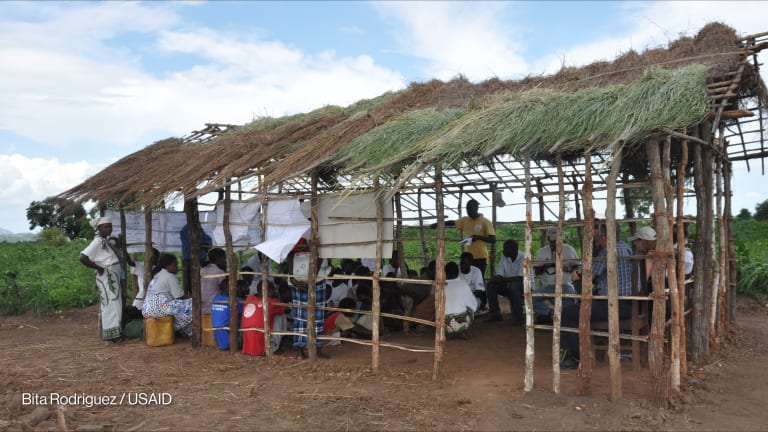
Nearly 12% of the global population faced severe food insecurity in 2020, with around 118 million more people facing hunger last year than in 2019, according to this year’s “The State of Food Insecurity and Nutrition in the World,” or SOFI, report.
Part of our The Future of Food Systems series
Find out how we can make food fair and healthy for all. Join the conversation using the hashtag #FoodSystems and visit our The Future of Food Systems page for more coverage.
This year’s SOFI report is the first assessment capturing the impact of the COVID-19 pandemic on hunger levels globally. It found that projections of a dramatic worsening in food insecurity were realized: Between 720 million and 811 million people were hungry in 2020. The report noted that it is not yet possible to quantify the full extent of the pandemic’s impact.
Even before COVID-19 hit, the trendline towards achieving Sustainable Development Goal 2, or ending hunger, was not moving in the right direction. Hunger levels had been increasing since 2014.
“The main takeaway from this report is that even before COVID-19 the world was not on track to end hunger and malnutrition in all its forms by 2030. There was conflict, climate extremes, economic downturns … What COVID-19 did in 2020 is exacerbate the situation,” Maximo Torero, chief economist at the Food and Agriculture Organization, told Devex. “The other major takeaway is that there is no improvement in terms of how many people have access to adequate food: 2.4 billion don’t have access.”
The annual report is jointly produced by FAO, the International Fund for Agricultural Development, UNICEF, the World Food Programme, and the World Health Organization. Data for the report, normally collected in person, was instead collected over the phone due to the pandemic.
The number of people experiencing moderate or severe food insecurity increased in every region of the world in 2020. In Africa, 46 million more people experienced hunger than in 2019. That number was 57 million in Asia, and in Latin America and the Caribbean, 14 million. The gender gap among those has also grown because of the pandemic, the report found.
“What COVID-19 did in 2020 is exacerbate the situation.”
— Maximo Torero, chief economist, FAOIn addition to job loss and lockdown-related measures impacting people’s access to food, other factors such as the closure of schools particularly affected children, Torero said. Millions of children did not receive the breakfast or lunch they used to eat at school.
There were also severe impacts on younger children. More than 149 million children under 5 were stunted, more than 45 million were suffering from wasting, and nearly 39 million overweight, according to report estimates. However, actual figures are expected to be even higher.
The impact of the pandemic was not only severe for 2020’s hunger numbers, the SOFI report found but will continue to affect the number of people who can access sufficient nutritious food for years to come.
Torero said that projections show that 30 million more people will be hungry in 2030 than would have been if the pandemic had not occurred, totaling 660 million people still unable to access enough to eat by the year the world strived to eliminate hunger.
Low-income countries hit hardest by spike in global food prices
Global food prices have been sharply rising, and the inflationary pressures could have serious consequences for the world’s poor, according to the World Bank and United Nations.
“There are people moving into undernourishment that will remain undernourished,” Torero said. “That is telling us that it’s not just an issue of the quick recovery in two years. The consequences last over time. And that’s serious.”
The report identifies six “pathways” to transforming food systems and eliminating hunger.
These include integrating humanitarian, development, and peacebuilding policies in conflict-affected areas; scaling up climate resilience across food systems; strengthening resilience of the most vulnerable to economic adversity; intervening along the food supply chains to lower the cost of nutritious foods; tackling poverty and structural inequalities, ensuring interventions are pro-poor and inclusive; and strengthening food environments and changing consumer behavior to promote dietary patterns with positive impacts on human health and the environment.
Ending hunger by 2030 will require “bold action,” the report found, and Torero said that must include increasing levels of financing.
“There is no one solution for all the countries. It requires investment. It would be improper to say this is for free,” Torero said. “This requires investment, and there [are] places where we can take the money.”
Agnes Kalibata, the U.N. Secretary-General’s special envoy to the United Nations Food Systems Summit to take place in September, said the findings of the report demonstrated that urgent reform is needed.
“The pandemic is only partly to blame. Hunger on this scale is not a symptom of COVID-19, it is a symptom of a dysfunctional food system that buckles under pressure and abandons the most vulnerable first,” Kalibata said in a statement. “The millions facing hunger today need immediate aid and assistance. But the generations to come need systemic change, and this is the aim of the U.N. Food Systems Summit, to transform food systems so they not only feed the world, but nourish it to its full potential.”
Visit the Future of Food Systems series for more coverage on food and nutrition — and importantly, how we can make food fair and healthy for all. You can join the conversation using the hashtag #FoodSystems.









